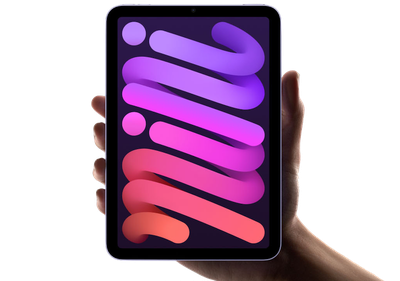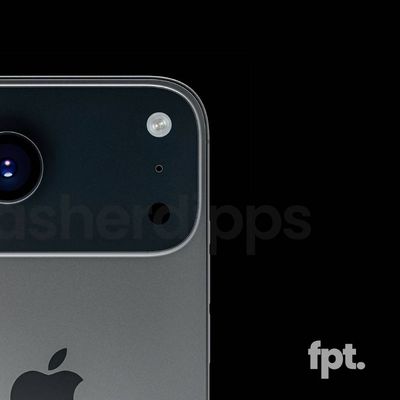Cellular iPad Mini Doesn’t Feature mmWave 5G Support, Unlike iPad Pro
Apple this week debuted the sixth-generation iPad mini, cellular models of which can connect to 5G for the first time. However, it's worth noting that cellular connectivity on the new iPad mini does not extend to support for faster mmWave 5G.

Apple doesn't maintain a cellular compatibility page for iPad models like it does for its iPhones, so the lack of mmWave 5G support on the iPad mini could surprise some Apple customers. Currently, Apple's mmWave 5G support is limited to the iPhone 13 lineup, iPhone 12 lineup, and the cellular variants of the 11-inch and 12.9-inch iPad Pro.
On the plus side, like the new iPhone 13 models, the iPad mini does support more 5G bands overall than iPhone 12 and cellular iPad Pro models, according to Apple, so the iPad mini does have greater 5G coverage around the world than the iPhone 12 and iPad Pro.
Despite rumors suggesting iPhone 13 models would support mmWave 5G in additional countries, support for mmWave remains limited to iPhone and iPad models sold in the United States, so its absence in the new cellular iPad mini is only likely to concern customers who are based there.
mmWave is a set of 5G frequencies that promise ultra-fast speeds at short distances, making it best suited for dense urban areas. By comparison, sub-6GHz 5G is generally slower than mmWave, but the signals travel further, better serving suburban and rural areas. All four iPhone 13 models support sub-6GHz outside of the United States, and sub-6GHz networks are more common in countries that have rolled out 5G.
Starting at $499 for the 64GB Wi-Fi-only model, the redesigned sixth-generation iPad mini is available to pre-order now on Apple's online store. Cellular models are available for $150 more over the base price of each configuration. iPad mini shipping begins Friday, September 24.
Popular Stories
While the iPhone 17 Pro and iPhone 17 Pro Max are not expected to launch until September, there are already plenty of rumors about the devices.
iPhone 17 Pro's alleged design via Front Page Tech
Below, we recap key changes rumored for the iPhone 17 Pro models as of March 2025:
Aluminum frame: iPhone 17 Pro models are rumored to have an aluminum frame, whereas the iPhone 15 Pro and iPhone...
If you pay for iCloud storage on your iPhone, Apple has a new perk for you, at no additional cost.
The new perk is the ability to create invitations in the Apple Invites app for the iPhone, which launched in the App Store last month.
In the Apple Invites app, iCloud+ subscribers can create invitations for any occasion, such as birthday parties, graduations, baby showers, and more. Anyone ...
Apple is expected to release iOS 18.4 to the general public as soon as next week, following more than a month of beta testing.
Apple's website says some iOS 18.4 features will be released in "early April," so the update should be out as early as Tuesday, April 1.
Apple this week seeded the iOS 18.4 Release Candidate, which is typically the final beta version, barring the discovery of any...
Apple today seeded the release candidate versions of upcoming iOS 18.4 and iPadOS 18.4 updates to developers for testing purposes, with the software coming a week after Apple released the fourth betas.
iOS 18.4 and iPadOS 18.4 can be downloaded from the Settings app on a compatible device by going to General > Software Update.
With iOS 18.4, Apple is adding the Priority Notifications...
Apple today announced that AirPods Max with a USB-C port will be gaining support for lossless audio and ultra-low latency audio with a firmware update next month, alongside the release of iOS 18.4, iPadOS 18.4, and macOS 15.4.
For context, audio files are typically compressed to keep file sizes smaller. There are lossy compression standards like MP3 and AAC (Advanced Audio Codec), which...
We're not getting new Siri Apple Intelligence features in iOS 18.4 as expected, but the upcoming update does have quite a few new additions that will be worth upgrading for. We've rounded up the five best features to look forward to, and if you're not running the beta, you can expect to get access to these in early April.
Priority Notifications
If you have an iPhone or iPad that supports...
Apple will launch its long-rumored foldable iPhone next year with a ~$2,000 premium price tag attached, expects well-connected Bloomberg reporter Mark Gurman.
Gurman's comments on Apple's launch plans for its first foldable device appeared in the Q&A section of his latest Power On newsletter. Earlier this month, the reporter said Apple's foldable iPhone could be arriving "as early as 2026,"...
Leaker Jon Prosser today shared a mockup of what he says the Messages app will look like in iOS 19, demoing an interface with rounded, translucent bubble-shaped navigation buttons at the top and softer, rounder corners for the keyboard and word suggestions.
Jon Prosser's Messages app mockup
The return button, a button for going back to the Messages list, and the FaceTime button have a deeper...























